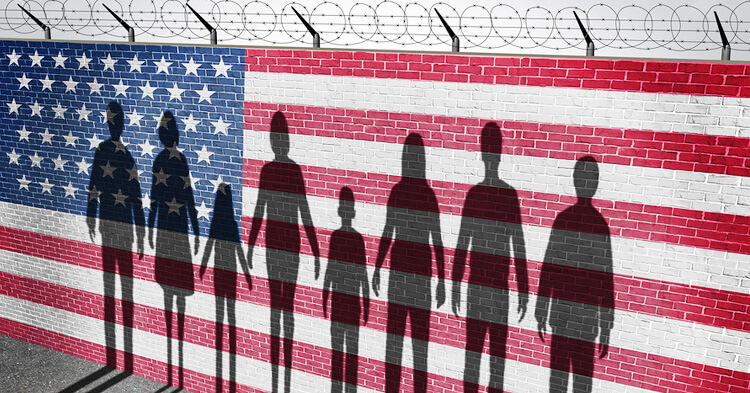The Wall is Already Built

For thousands of years, walls have been built to deter enemies, both real and perceived, from penetrating the inner sanctum of the core inside the walls. From Greece to China to Berlin, the walls have been erected — and have fallen — at the whim of military and political leaders. In 2016, the idea of a wall between Mexico and the U.S. seemed to generate momentum.
“Build the wall!” some shouted at political rallies during the presidential campaign.
“Build the wall!” some taunted.
“Build the wall!” some yelled at schools dotting the country.
The Wall, as the idea exists today, would purportedly protect our country from immigrants streaming across the border on foot, in cars, by boat. In pairs, with human couriers, or children alone. The Great Wall of America would surely save our country by placing a physical barrier between Us and Them.
As America argues between parties and ideologies about needing a wall, the disdain inferred by building such wall, and perhaps most of all, who might pay for this wall, one thing has become clear:
We have already built the wall.
We have built the wall with an abundance of partisanship, false information, racial divide, and homophobia. We have built the wall with classism and sexism. Gay vs. straight. Black vs. white. Immigrant vs. citizen. Democrat vs Republican. Men vs women. City vs country.
Us vs Them. Me vs You.
Instead of mortar and wire, we have commandeered language and actions to create the divide. Have you used the words “special snowflake”, “idiot conservatives”, or “libtard” as an insult? That’s a whole section of wall. Have you unfriended every single person who disagreed with your beliefs on Facebook? There’s a section. A longtime family friend blocked me on Facebook for disagreeing with his views on the election. Now, not only will we not discuss the election, we probably won’t discuss anything at all. That feels like a giant wall.
Bricking ourselves into an echo chamber filled only with those who hold similar beliefs is one way to wall ourselves off and separate us from our neighbors. We start to see ourselves as right and them as wrong. Confirmation bias is easy; genuine research is hard. It’s much easier to rely on what we know already to make a decision and stick to it, because otherwise, we waffle. And no one likes to waffle.
What would it take to change your mind?
An article by Harvard instructor and author David Ropeik in Psychology Today illustrates the conundrum:
“Shouldn’t a cognitive mind be open to evidence…to the facts…to reason? Well, that’s hopeful but naïve, and ignores a vast amount of social science evidence that has shown that facts, by themselves, are meaningless. They are ones and zeroes to your mental computer, raw blank data that only take on meaning when run through the software of your feelings.”
A story a friend told me recently gives me a bit of optimism: she grew up learning that anyone claiming to be transgender was someone just trying to get attention or they were mentally ill. Then the child of one of her neighbors came out as transgender, and she was faced with an opportunity to reevaluate. These neighbors were friends of hers. She loved her neighbors; she loved her neighbors’ children. The cognitive dissonance of the belief she had learned as a child and the reality in a family she cares about collided.
“I understand now,” she said. “I had never known anyone gay or transgender before, and I just didn’t get it.”
Perhaps, instead of walling off your friends and relatives who appear to have different beliefs, drill down with them and find out where their fears lie. Ask them why they believe something. Get to the heart of it and try to see. Once you understand better their motivation life perspective, you might find that your beliefs aren’t as far apart as you think. And even if they are, perhaps you might see an opportunity to teach… or learn. Ask someone what Black Lives Matter means to them. Ask someone why they don’t believe in feminism. Ask someone what is important to them. Ask someone what experience they have with immigration. You don’t have to agree, even if you understand. But maybe you’ll find some good there.
Read: don’t unfriend people just because you disagree. Think about it, under the anger. Remember that people have “online personas” for which they feel comfortable yelling into the void, but if you have that same conversation one on one, it’s much different. Go private and ask them to clarify.
It takes effort on both sides to reach that middle ground. All sides. I see both sides angling for position, committing the same “crimes” against each other, not even trying to make the effort to unite and understand that we are all in this together. Nobody is taking the time to rise above the chatter and decide to come to a middle ground. It’s playground fighting on a national level; this election has reduced our population to a bunch of fighting kids, and the bell isn’t ringing for the end of recess and there aren’t any adults around to reorient them back to common sense and rationality. As humans, we all are subject to the same patterns of thinking, that we all fall into the trap of believing that what we think is right and all others are wrong. And that we need to be aware of this.
By no means should you stop protesting or stop speaking up. Ensure your voice is heard in a way that you are modeling the behavior we want to see (and remember, no one is perfect — we all slip up). We can hold the feet of our politicians to the promises they make to unify the country. Not long ago, I responded on Twitter to a statement that was antithetical to what I believe. I asked for clarity to try to understand. As a result, several of this person’s followers jumped in to attack me from all sides, typing quick, pointed insults in retaliation for my questioning. With effort (and sometimes gritting my teeth), I didn’t attack back but responded with more questions and understanding, where I could find it. The outcome was positive, in the end. Two people who had jumped in to make fun of me came around and said that they would listen to me because I was so nice about it. We may not agree, but we can still listen to each other and try to really hear the answers.
When opposite sides try to understand each other better, when people try to see an issue from another perspective, and when party loyalists begin to look critically within to see where they could find common ground with others instead of pushing their own agenda ahead, then we’ll find that we don’t need a wall. What we need is a bridge.








